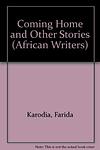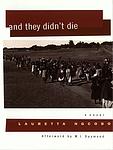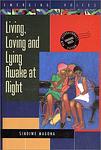The Greatest Austrian, South African "Fiction" Books Since 1980
Click to learn how this list is calculated.
This list represents a comprehensive and trusted collection of the greatest books. Developed through a specialized algorithm, it brings together 300 'best of' book lists to form a definitive guide to the world's most acclaimed books. For those interested in how these books are chosen, additional details can be found on the rankings page.
Genres
Countries
Date Range
Reading Statistics
Click the button below to see how many of these books you've read!
Download
If you're interested in downloading this list as a CSV file for use in a spreadsheet application, you can easily do so by clicking the button below. Please note that to ensure a manageable file size and faster download, the CSV will include details for only the first 500 books.
Download-
1. Disgrace by J M Coetzee
"Disgrace" is a novel that explores the life of a middle-aged professor in South Africa who is dismissed from his position after having an affair with a student. After losing his job, he moves to the countryside to live with his daughter, where they experience a violent attack that significantly alters their lives. The story delves into themes of post-apartheid South Africa, racial tension, sexual exploitation, and the struggle for personal redemption.
-
2. Waiting for the Barbarians by J M Coetzee
The novel is set in a small frontier town of an unnamed empire, where the magistrate lives a life of civil service and relative peace. His world is disrupted when the Empire declares a state of emergency due to rumors of barbarian uprising. The magistrate becomes a critic of the Empire's brutal and inhumane methods of dealing with the perceived threat, which leads to his arrest and torture. As he tries to understand his role in the vast political machinery, he also grapples with questions of power, justice, and humanity.
-
3. Life & Times of Michael K by J M Coetzee
Set in South Africa during a civil war, the novel follows the journey of Michael K, a simple gardener with a cleft lip. When his mother falls ill, he attempts to take her back to her rural birthplace. After she dies en route, Michael continues the journey alone, struggling to survive in a war-torn landscape, while also being caught up in the bureaucratic red tape of the dystopian society. The story explores themes of freedom, survival, and the human spirit's resilience against adversity.
-
4. The Piano Teacher by Elfriede Jelinek
"The Piano Teacher" is a dark exploration of power dynamics, sexuality, and repression. The story revolves around a piano teacher at a prestigious music school in Vienna who lives with her overbearing mother in a state of emotional and sexual repression. Her life takes a turn when she becomes sexually involved with a young, self-assured student. The relationship, marked by sadomasochistic games and emotional manipulation, spirals out of control, leading to a tragic end. The book is a profound critique of bourgeois values and the oppressive structures of society.
-
5. July's People by Nadine Gordimer
"July's People" is a novel set in a hypothetical future where South Africa's apartheid system has collapsed and the nation is embroiled in a brutal civil war. The story follows a liberal white family who, fleeing the violence, are taken in by their black servant, July, in his rural village. The book explores the power dynamics and complexities of their relationship, as they navigate this new reality where traditional roles are reversed, and grapple with issues of race, class, and privilege.
-
6. Extinction by Thomas Bernhard
"Extinction" is a novel that explores the dark and complex themes of family, identity, and history through the eyes of its protagonist, a professor living in Rome. When he receives news of the deaths of his parents and brother in a car accident, he is forced to confront his past and his Austrian heritage. The narrative delves into his thoughts and feelings, his criticisms of his family and society, and his philosophical musings on life and death, all while he prepares to return to his family's estate for the funeral. The novel is renowned for its dense, stream-of-consciousness style and its unflinching examination of the human condition.
-
7. Concrete by Thomas Bernhard
The book is a darkly introspective narrative that delves into the mind of a reclusive, obsessive intellectual who is struggling to complete his scholarly work on the composer Mendelssohn. As he grapples with his own ailments and the perceived mediocrity of his surroundings, the protagonist's stream-of-consciousness monologue reveals his deep-seated anxieties, self-loathing, and profound isolation. The narrative is a relentless examination of the protagonist's psyche, showcasing his critical view of society and his own personal relationships, which are fraught with tension and dysfunction. Through this, the novel explores themes of artistic creation, intellectual elitism, and the suffocating nature of expectations and familial obligations.
-
8. Woodcutters by Thomas Bernhard
Woodcutters is a darkly humorous critique of Vienna's artistic elite. The story takes place over the course of a single evening, as the narrator attends a dinner party in honor of a recently successful actor. As the evening progresses, he reflects on the pretentiousness and hypocrisy of the guests, the mediocrity of their artistic achievements, and the tragic suicide of his former lover. The novel is a scathing indictment of the vanity and self-delusion of the artistic community.
-
9. Wittgenstein's Nephew by Thomas Bernhard
"Wittgenstein's Nephew" is a semi-autobiographical novel that explores the friendship between the narrator and his friend Paul, who is the nephew of the famous philosopher Ludwig Wittgenstein. The story takes place in Vienna and is set against the backdrop of the Austrian mental health system. The novel delves into themes of sanity, insanity, and the fine line that separates the two, while also offering a critique of Austrian society. It is a meditation on the nature of illness, both physical and mental, and the impact it has on personal relationships and one's perception of the world.
-
10. Ancestral Voices by Etienne van Heerden
"Ancestral Voices" is a haunting novel set in South Africa during the apartheid era. The story follows a young boy who grows up in a small rural town, navigating a complex web of familial relationships and secrets. As he matures, he becomes increasingly aware of the racial and social injustices that surround him. The book explores themes of identity, heritage, and the harsh realities of life under apartheid, all weaved together with a deep sense of the mystical and the supernatural.
-
11. The Afternoon of a Writer by Peter Handke
"The Afternoon of a Writer" is a contemplative exploration of a day in the life of a solitary writer who, after a successful morning of writing, decides to take a walk through an unnamed European city. As he strolls, he grapples with feelings of alienation and existential dread, questioning his purpose and the worth of his work. The book delves into the writer's inner struggles, his observations of the world around him, and his reflections on the act of writing itself.
-
12. The Last World by Christoph Ransmayr
"The Last World" is a novel that reimagines the exile of the Roman poet Ovid in a remote village at the edge of the Black Sea. The story is set in a mythical time and place, where the villagers are haunted by strange transformations and echoes of Ovid's metamorphoses. The novel blurs the lines between the real and the imaginary, the past and the present, and the world of the living and the dead, creating a surreal and dreamlike atmosphere.
-
13. Lust by Elfriede Jelinek
This book is a provocative exploration of the dynamics of power and desire within the confines of a loveless marriage. Set against the backdrop of the Austrian Alps, it delves into the life of a woman trapped in a relationship with her abusive and unfaithful husband, a powerful paper mill owner. The narrative dissects the commodification of sex, the objectification of women, and the societal structures that perpetuate these themes. Through a stark and unflinching examination of the protagonist's degradation and the pervasive corruption in her world, the novel presents a scathing critique of consumerism, the patriarchy, and the hollow nature of modern relationships.
-
14. Fiela's Child by Dalene Matthee
The book is a poignant tale set in 19th-century South Africa, where a young white boy, believed to be lost by his biological family, is found and raised by Fiela, a compassionate and strong-willed woman of the Khoikhoi community. The story unfolds as the boy, named Benjamin, grows up with a deep sense of belonging in Fiela's family, only to have his identity and future thrown into turmoil when government officials, enforcing racial classifications of the time, remove him from his home. He is then forced to live with a destitute white family in the dense Knysna Forest, leading to a profound exploration of identity, race, and the meaning of family, as both Fiela and Benjamin struggle to reclaim their lives and assert their rightful place in a society governed by strict racial divides.
-
15. The Snows Of Yesteryear by Gregor von Rezzori
"The Snows of Yesteryear" is a memoir that explores the author's complex and tumultuous upbringing in Eastern Europe during the early 20th century. Through a series of vivid and poignant anecdotes, the book delves into the author's personal experiences with war, displacement, and the collapse of the Austro-Hungarian Empire, offering a deeply introspective and nostalgic reflection on the fleeting nature of time and the enduring impact of one's past.
-
16. Another Country by Karel Schoeman
"Another Country" is a historical novel set in 19th century South Africa, following the life of an Irish woman who immigrates to the country. The narrative explores her experiences and struggles as she adapts to the harsh realities of a new land, while also providing a vivid portrayal of the racial, political, and social tensions of the era. The book offers a deep insight into the complexities of colonialism and the formation of modern South Africa.
-
17. Between Two Worlds by Miriam Tlali
"Between Two Worlds" is a compelling narrative that explores the harsh realities of apartheid in South Africa through the eyes of its protagonist, Muriel. The story delves into Muriel's life as she navigates the oppressive societal structures that enforce racial segregation and discrimination. Working in a Johannesburg store, she encounters a microcosm of apartheid's broader societal impacts, including the complexities of interracial relationships and the struggle for dignity and identity amidst pervasive racism. The novel poignantly captures the personal and political conflicts faced by those trapped between the traditional and the modern, the rural and the urban, in a time of profound injustice.
-
18. Coming Home And Other Stories by Farida Karodia
"Coming Home And Other Stories" is a collection of short stories that delve into the lives of individuals grappling with the complexities of identity, displacement, and belonging, primarily within the context of South African society. The narratives explore themes of apartheid, racial discrimination, and the struggle for liberation, as well as the personal challenges of family dynamics, love, and loss. Through a variety of characters and settings, the stories offer a poignant reflection on the human condition and the search for home, both in a literal and metaphorical sense, highlighting the resilience of the spirit amidst social and political turmoil.
-
19. And They Didn't Die by Lauretta Ngcobo
This novel explores the resilience and struggles of a group of women in a rural South African village during the apartheid era. As they grapple with oppressive laws, land seizures, and the forced labor system that sends their men to work in distant mines, the women band together to sustain their families and community. Their story is one of survival and solidarity in the face of systemic racism and sexism, highlighting the intersection of personal and political battles while showcasing the strength and endurance of women under extreme hardship.
-
20. Master Harold...And The Boys by Athol Fugard
The play takes place in South Africa during the era of apartheid and revolves around the complex relationship between a young white boy and two black men who work in his mother's tea room. The boy has grown up with these men and shares a close bond with them, but as he struggles with personal turmoil and the pressures of the racist society around him, he begins to assert his racial superiority, leading to a devastating display of discrimination and the shattering of their familial relationship. The narrative explores themes of racism, human dignity, and the impact of societal injustice on personal relationships.
-
21. Living, Loving And Lying Awake At Night by Sindiwe Magona
"Living, Loving And Lying Awake At Night" is a poignant and introspective memoir that delves into the life experiences of the author, exploring themes of love, loss, and the challenges faced by women in a patriarchal society. Through her powerful storytelling, the author reflects on her personal journey, including her upbringing in rural South Africa, her struggles as a single mother, and her pursuit of education and career success. With honesty and vulnerability, the book offers a compelling exploration of the complexities of life and the resilience of the human spirit.
-
22. Elizabeth Costello by J M Coetzee
The novel follows the life of Elizabeth Costello, a renowned Australian writer, as she navigates through her twilight years. Through eight different narratives, the book explores her perspectives on various topics, including animal rights, the nature of evil, and the difficulty of understanding oneself. The novel is a profound exploration of the human condition, the nature of storytelling, and the conflict between life and art.
-
23. The Loser by Thomas Bernhard
"The Loser" is a philosophical novel that revolves around the complex relationship between three friends who are all piano virtuosos. The narrative is driven by the protagonist's obsession with his friend's suicide, which he believes was triggered by the realization that they could never surpass the genius of their third friend. The book delves into the protagonist's psyche as he grapples with themes of talent, ambition, failure, and the destructive power of comparison.
-
24. Third World Express by Mongane Serote
"Third World Express" is a powerful and thought-provoking collection of poetry that explores the harsh realities of life in South Africa during apartheid. Through vivid imagery and evocative language, the author captures the struggles, hopes, and resilience of the marginalized communities, shedding light on the social and political injustices they face. With a blend of anger, sorrow, and determination, the poems in this book challenge the status quo and call for a more just and equal society.
-
25. This Life by Karel Schoeman
"This Life" is a reflective narrative that delves into the memories and experiences of an elderly South African woman as she nears the end of her life. Set against the backdrop of the 19th-century Boer society, the story unfolds through her introspective journal entries and letters, revealing the intimate details of her personal journey, her relationships, and the quiet struggles she endures. The novel poignantly explores themes of isolation, the passage of time, and the search for meaning, offering a contemplative look at the universal human condition through the lens of a solitary life lived amidst the vast landscapes of South Africa.
Reading Statistics
Click the button below to see how many of these books you've read!
Download
If you're interested in downloading this list as a CSV file for use in a spreadsheet application, you can easily do so by clicking the button below. Please note that to ensure a manageable file size and faster download, the CSV will include details for only the first 500 books.
Download























